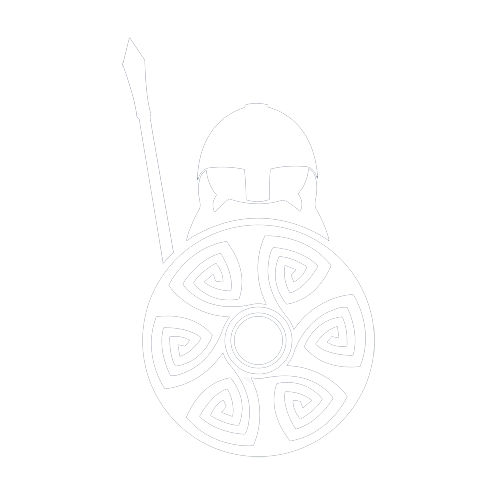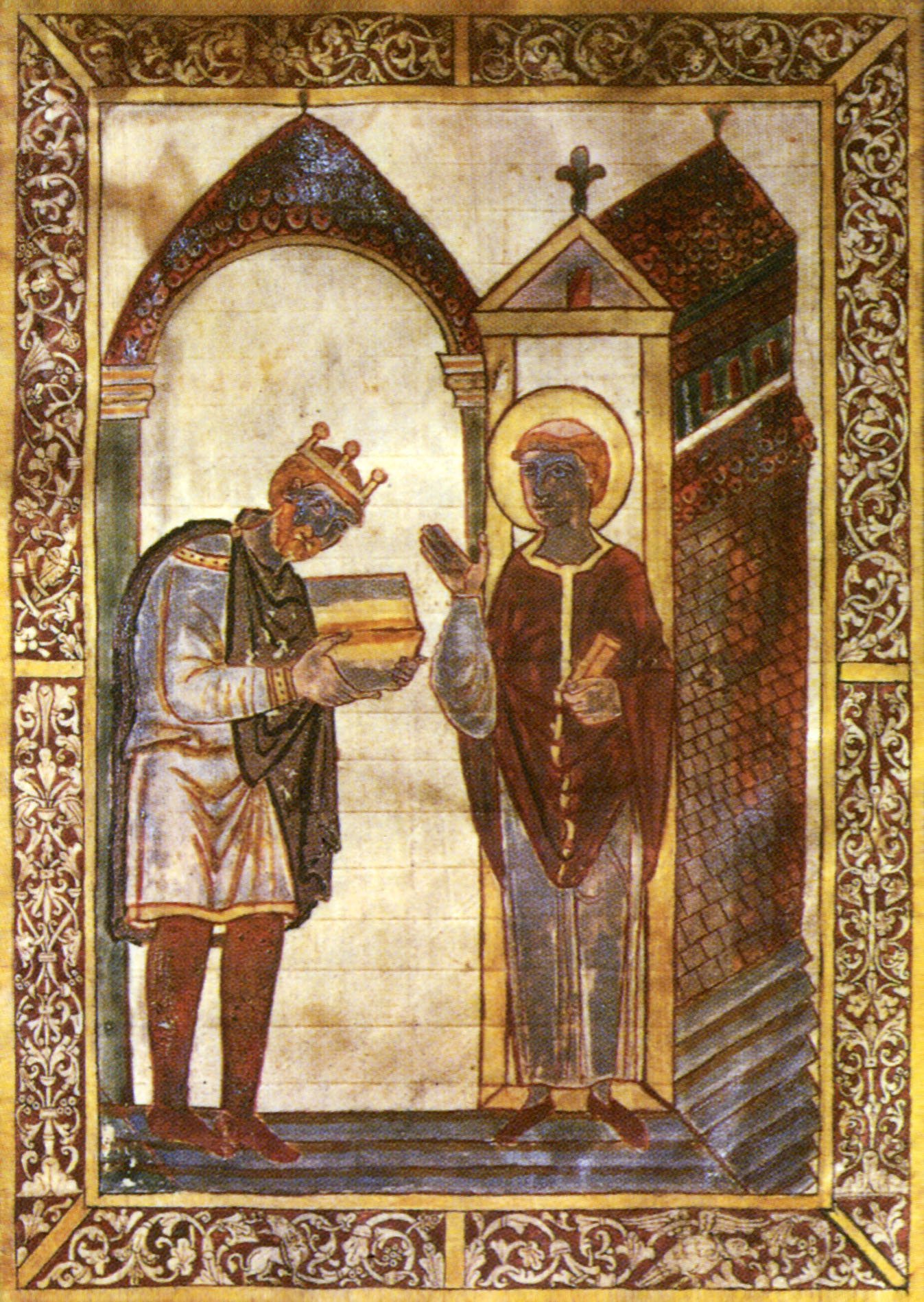King Aethelstan King of all England
King Aethelstan (Æthelstan or ‘Noble Stone’) was the son of Edward the Elder, and king of all England from 925-939. Another of the conquering kings of Wessex, Aethelstan expanded his father's kingdom, gave much to the church and enhanced the power and prestige of kingship. Forming allies across Europe, and ruthlessly subjugating Wales, the Scots and the Danes, Aethelstan was one of England's great kings.
| Born | 895 |
| Parents | Edward the Elder & Egwynn |
| Married | No |
| Children | None |
| Died | 27 October 939, Gloucester, buried at Malmesbury (44) |
| Reign | 925 - 939 (14) |
| Crowned | 4 September 925, Kingston upon Thames (30) |
| Predecessor | Edward the Elder (father) |
| Successor | Edmund I (half-brother) |
| House | Wessex |
Life Events of King Aethelstan
895
Aethelstan is born to Edward the Elder and Egwynn.
925
Aethelstan becomes King Aethelstan of all England, and is crowned at Kingston upon Thames.
926
Aethelstan marries his sister, Eadgyth, to the Viking king of Jorvik (York), Sihtric Cáech, creating peace between the kings.
927
King Sihtric dies, and his brother Guthfrith of Ivar (Gofraid ua Ímair) arrives from Dublin to stake his claim. Aethelstan marches north and takes York, and receives submission of the Danish people. Aethelstan now commands York and the north for the first time.
927
On 12 July, Aethelstan meets King Constantine of the Scots, Owain of Strathclyde and the Welsh rulers, Hywel and Owain of Gwent at Eamont, Cumbria. He demands their allegiance, and insists they do not support Guthfrith's claim to York. They all accept Aethelstan's overlordship.
928
Welsh rulers start attending Aethelstan's court, and are treated with high status. Hywel Dda of Deheubarth was one of the firmest Welsh allies of England.
933
Aethelstan's half-brother Edwin mysteriously drowns at sea.
934
Aethelstan learns that King Constantine of the Scots has married his daughter to Olaf Guthfrithson of Dublin, a direct claimant to York. Aethelstan gathers his allies, including 4 Welsh kings, and invades Scotland by land and sea, a difficult task given the distance. He raids Dunnottar by land, and Caithness and possibly Orkney by sea.
936
Aethelstan sends English troops to France, for the first time, to help his nephew Louis IV reclaim the French crown.
937
Olaf Guthfrithson, now married to the daughter of Constantine, marches south in the autumn and invades England. His focus is to recapture Jorvik (York). Aethelstan delays his response, possibly by surprise of the late attack. The north was being plundered, when Aethelstan eventually marches north.
937
Guthfrithson and Constantine rallied allies from Ireland, the Isle of Man and Strathclyde. The two armies meet at the Battle of Brunanburh, one of the most bloody conflicts England has seen. Aethelstan's army, which includes his half-brother Edmund, are victorious, inflicting heavy losses on the invaders. Five kings and seven earls are killed, but Olaf and Constantine manage to escape.
939
King Aethelstan dies unexpectantly, on 27 October in Gloucester. He is buried at Malmesbury Abbey.
939
Aethelstan's half brother, Edmund, succeeds Aethelstan.
939
Hearing the news of the succession, the Danes in York revolt, demanding Sihtric's line succeeds, and recapture Jorvik.
“ANGLOSÆXNA REX ET RECTOR”
Interesting Facts About King Aethelstan
Succession Struggles
There was a period of succession struggle after Edward the Elder died. Aelfweard, Aethelstan's younger brother, was seen as most suited for succession. His mother was legitimately married to Edward. But there was disputes over whether Aethelstan's mother had married to Edward at all. It seems they did marry, but in secret. It took over a year for Wessex to accept Aethelstan as king.Edwin
Edwin, one of Aethelstan's half-brothers, may have been caught up in a plot to blind Aethelstan in 924/5, despite his denials. The plot apparently centred around a courtier called Alfred, which could have been born out of legitimacy fears for the crown, with Aethelstan's nobility in question. In 933, after refusing to have Edwin executed, Aethelstan sent him to sea on a boat with no sail, and no provisions. Edwin, fearing starvation, threw himself into the sea, where he drowned. Aethelstan later admitted his regret, and paid penance for his sin.European Marriage
A number of Aethelstan's female family members had been married off to European kings. But one of his sisters, Eadgyth, was chosen by Aethelstan to marry Otto, Duke of Saxony. Otto would later become Holy Roman Emperor in 962.Harald Finehair
Aethelstan was a generous king who loved the arts. He shared his passion with the King of Norway, Harald Finehair. They exchanged gifts on many occasions, and became friends. Aethelstan invited Harald's son, Haakon, to court where he taught him the ways of kingship. Haakon would go on to return home in 935, and evict his brother.Trading and Currency
Aethelstan's England boomed, both commercially and culturally. An effective administrator, law maker and religious benefactor, Aethelstan was able to introduce a single currency and outlaw Sunday trading.
Battles Fought by King Aethelstan
Capture of York
In 927, victory for Aethelstan as he takes York from the Danes.Invasion of Scotland
In 934, Aethelstan successfully invades Scotland, raiding by land and sea.Aid in France
In 936, Aethelstan sends his troops to France, to aid his nephew Louis IV to reclaim the French throne.The Battle of Brunanburh
In 937, Aethelstan wins a huge victory at the Battle of Brunanburh, heavily defeating an allied force of Scots, Irish, Celts and Danes.
FAQs About King Aethelstan
Was King Aethelstan married?
No, King Aethelstan did not marry.Was King Aethelstan a bastard?
No. King Aethelstan's mother married Edward the Elder in secret, but this was disputed by the Wessex witan. It took over a year for Wessex to accept Aethelstan as king.How did King Aethelstan die?
All we know is that he died unexpectantly in Gloucester, and was buried in Malmesbury Abbey.Why was King Aethelstan so great?
Following in the footsteps of his father and grandfather, Aethelstan succeeded in ruling the whole of England, fulfilling his grandfather, Alfred's dream. He also ruled over a thriving commercial and cultural England, administering laws and legislation, creating a single currency and boosting the church's coffers.
Related Videos to the King
The Anglo-Saxon Kings of England



